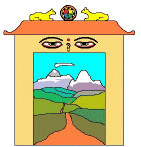Dear Mountain Forum-Asia,
It
is my great pleasure to welcome you all to the series of
e-consultations on 'People, Park and Mountain Tourism', April 2-21, to
mark the 50th Anniversary (‘Golden Jubilee’) of the
first ascent of Mount Everest.
I want to make three small points here.
Firstly,
Mount Everest, by just being the highest mountain in the world,
receives a disproportionate share of attention. Its rich history is in
many ways a direct function of its altitude - which for long served as
a benchmark of human feat. It still does. Whether we like it or not,
Everest draws attention away from other ‘lesser’ peaks in the world,
most of which predate the former. The areas around the lesser
peaks may, in fact, be in more dire need of protection, donor
funding and tourism. Let us, therefore, not forget all other
mountains in the world, in our rush to celebrate Everest and the 50th anniversary of its first ascent this year.
Secondly, mountain tourism
allows the host community to diversify their livelihood options.
It benefits them in many ways. For trekkers, climbers,
pilgrims, and research and development workers, mountains provide
inspiration, meaning and joy. When the host community and the
visitors interact, both are transformed to some degree through
the creation of largely a symbiotic
relationship. We need to treasure and nurture this relationship, this bond.
The health of this bond is dependent not only on the quality of interactions
between the host community and the visitors but also on the health of the totality of
the space
(with fluid boundaries) in which these interactions take place. This
necessitates that we manage the health of the mountain ecosystem, with
its biodiversity, watersheds, glacial lakes, pastures and forests. How
to manage this fragile space (teeming will all kinds of possibilities
and threats) sustainably is a major challenge and will continue to be
so.
Thirdly,
the ‘Golden Jubilee’ is an occasion for celebration. What Sir
Edmund Hillary and Tenzing Norgay Sherpa accomplished together some 50
years ago, and thereafter, continues to inspire us. Their
philanthropic work in the Khumbu region in particular will be long
remembered.
They have taught us to give
back to the mountain community what we take from them many
times over.
Last
but not least, I want to thank the Asia Pacific Mountain Network along
with the Bridges-PRTD and Namche Conference for organising the
e-consultations on the following themes related to ‘People, Park and
Mountain Tourism’:
- Cultural and ecological impact of tourism
in remote mountainous destinations
- Security issues related to tourism in remote mountainous
destinations
- Management systems: parks, protected areas, community-based
development
- Shaping the future: achieving optimal results in the global
market
I am
sure you will have a fruitful discussion.
Yours sincerely,
Dr. Binayak
Bhadra
Acting Director General, ICIMOD


